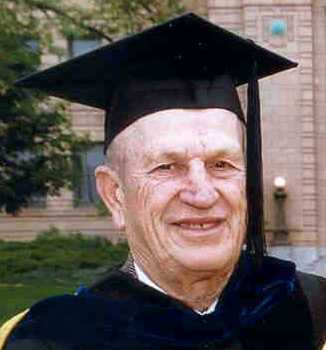Next Profile
Achievement Profile: Edward Erazmus
Honoring the Founders of the ESL Profession
Prof. Edward Erazmus, Ph.D., Professor Emeritus, learned at the University of
Michigan during the earliest days of the ESL profession. He
established the Applied English Center at the University of
Kansas in 1964, and dedicated much of his research
to developing ways to explain concepts of anchorage and
articulatory settings to learners of English. 82 years young--he
runs two miles every day--Professor Erazmus uses a laptop, but is not on the Internet
yet. His daughter, Ms. Le-Thu Erazmus, M.S.E.,
relayed these interview questions to him and sent in her
father's Word document via e-mail (erazmus@ku.edu).
Some Edward Erazmus links:
Teaching the Phonology via Articulatory Settings (1983)
What is your main ESL activity now? What are your
principal projects, and what is on the back burner?
I was very happy to leave academia in 1985 but had contacts with the University through the Professors Retiree's Club. Eventually I got tired of that and started to focus more on my hobbies on the small farm that I purchased back in the mid 1970s. I am enjoying jogging on my long driveway and feeding the cows. But the cows are out of the picture now, so life is delightful.
My serious research at this moment is "discourse analysis." I take a 500-word, English-written text and apply this technique to any language in the world that can be roughly written phonemically. I hope to find enough data in such a discourse to break the linguistics code or simply to provide a workable grammar of the language. While English is my source language, I also have interests in Polish (my native language), Spanish, German, and French. My object is to develop a method by which we can create a grammar without reference to the meaning of words; thus, why is an English sentence defined as "subject + verb + object" and a question as "verb + subject + object"?
Equipped with this information, the learning of a new language would be greatly expedited – something we should work for in this shrinking world. Why should all nations on earth learn English, (or at least the wealthy top few in each country)? Nice for us, but how about us learning other languages easily and quickly. I should say right away that progress is very slow and tedious. But new insights do come through. My research has only touched the surface of things, so if you have further questions, please write again.
How did you start your ESL career? Who influenced
your decision? What were some important formative
experiences in the early stages of your development?
I got my M.A. and Ph.D. degrees from the University of Michigan. Among my mentors were Fries, Markwardt, Lado, Kurath, Pike, and others. Fries always regarded himself as the originator of the so-called 'oral method' which is training in the language being learned through intensive oral drill used. I worked in Michigan's Center while doing my graduate work.
When I got to the University of Kansas (KU), I was given the job of creating the Applied English Center (AEC) and was given free reign to do so. In addition to using Fries' basic oral drill, I initiated the writing of compositions and book reports in the AEC program. Things went well until student action intervened and there was a student strike on campus with a group of students protesting the use of an older campus building for our classes. At any rate, I was replaced as the Director of the AEC and converted to classroom teaching, in particular graduate-level seminars in the Linguistics Department and the School of Education. The result was a fairly large collection of copies of dissertations in language study.
I retired in 1985 and retirement was a very happy event.
If you had to give three pieces of advice to a
new ESL teacher, what would they be?
1. Treat ALL students equally and respectfully, irrespective of country of origin or sources of financial support. In addition, it is helpful to students if the teaching staff can help provide counseling (when needed), help in locating living facilities, etc.
2. I strongly encourage teaching staff to participate in all aspects of student testing, screening, advising, and working with university offices in helping students to integrate into a university setting.
3. Have a series of social activities involving teaching staff and students (i.e., activities such as picnics, dances, parties, and other forms of social interaction between students and faculty/staff).
Interviewed by Robb Scott
2002 ESL MiniConference Online
A New Look at a Cause of Foreign Accent (1982)
English as a Second Language: A Reader (1980)
The Applied English Center at Kansas University
An ESL MiniConference Online interview
with Edward T. Erazmus: